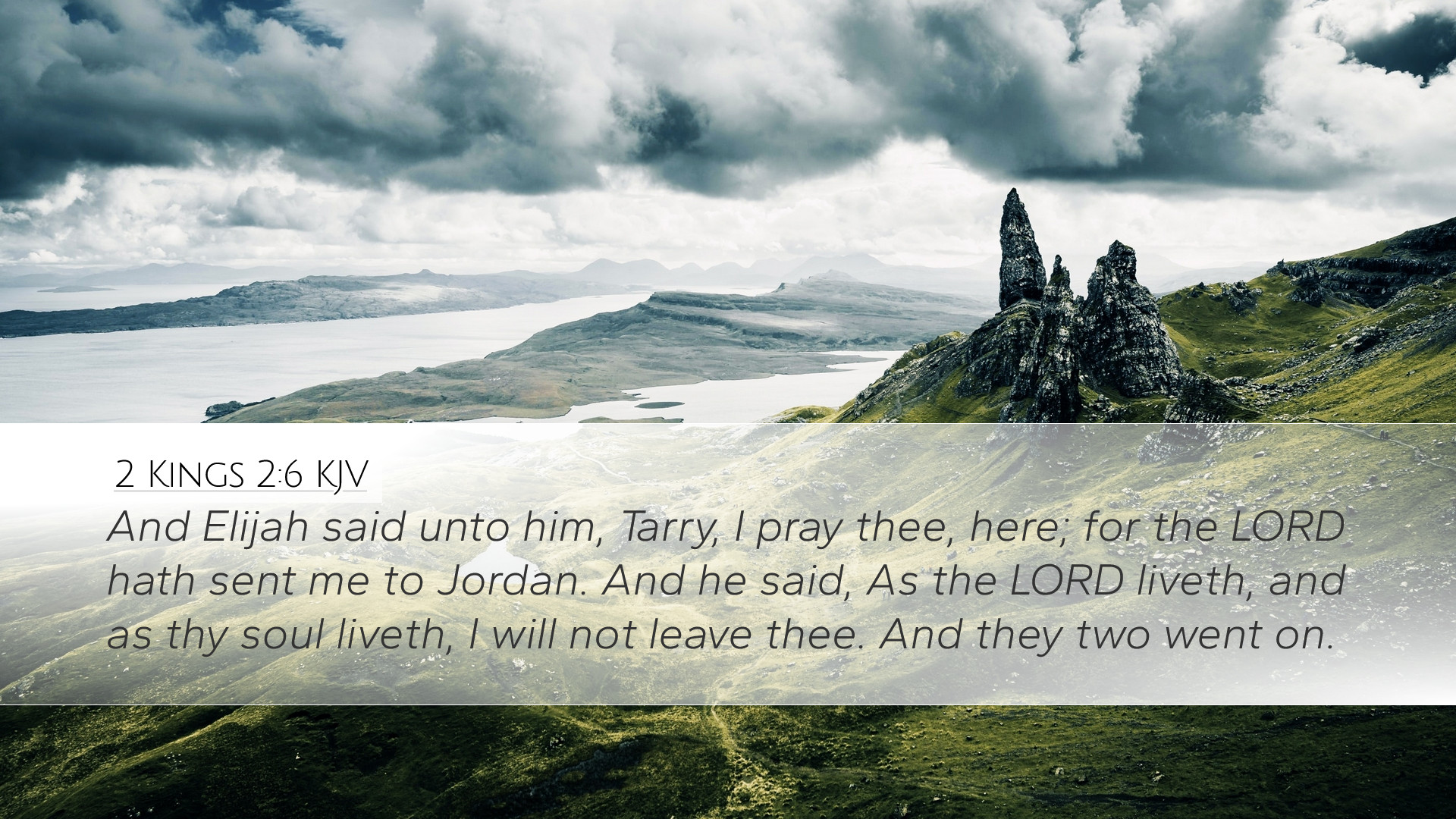Commentary on 2 Kings 2:6
Bible Verse: "Then Elijah said to him, 'Stay here, please, for the Lord has sent me on to the Jordan.' But he said, 'As the Lord lives, and as your soul lives, I will not leave you!' So the two of them went on." (2 Kings 2:6)
Context and Background
The passage of 2 Kings 2 details the final moments of the prophet Elijah as he prepares to be taken up to heaven. This event holds significance not only in the historical context of Israel's prophetic ministry but also in the theological implications it suggests about succession, faithfulness, and divine appointment. Understanding the dynamics between Elijah and Elisha is crucial as it signifies a transfer of prophetic authority and anointing.
Insights from Commentaries
-
Matthew Henry:
Henry emphasizes the significance of divine guidance in the life of a prophet. In this verse, Elijah's directive to stay indicates a moment of testing for Elisha. It serves to highlight not only Elisha's loyalty but also God's ongoing purpose for him amidst the prophetic tradition. Elisha's unwavering response demonstrates a strong commitment to follow God's chosen vessel, which reflects his own call to prophetic ministry.
-
Albert Barnes:
Barnes points out that Elijah’s command for Elisha to stay behind is a customary test of devotion. This act of staying or leaving mirrors the call and commitment required in the life of a disciple. Elisha's pledge, “As the Lord lives,” underscores his faith and determination. Barnes correlates this with how disciples of Christ must resolve to follow Him wholeheartedly, indicating that true discipleship often requires enduring trials and tests of loyalty.
-
Adam Clarke:
Clarke delves into the character of Elisha and his response to Elijah's trial. He highlights that Elisha's determination to remain with Elijah is indicative of the strength of his spiritual resolve. Clarke suggests that this may also reflect Elisha's understanding of the gravity of the situation—the imminent departure of Elijah—and his desire to absorb as much spiritual wisdom and experience as possible. He sees this as a critical moment of preparation for the mantle that Elisha is about to receive.
Theological Implications
This verse is rich in theological themes, including loyalty, sacrifice, and the sovereign hand of God in the calling of His prophets. Elijah's prophetic ministry is coming to an end, but the Lord’s work continues through Elisha. The tension in the command to stay hints at the potential for abandonment in faith. In the Christian context, it can be viewed as a call to remain steadfast in one's faith journey, even when circumstances challenge our resolve.
The insistence of Elisha not to part from Elijah signifies the importance of mentorship and the transfer of spiritual authority. This moment can also draw parallels to the New Testament, where Jesus calls his disciples to follow him with the same commitment and fervor displayed by Elisha.
Application for Pastors and Theologians
For pastors, the passage serves as a reminder of the importance of nurturing and mentoring those who are coming behind in the faith. The relationship between Elijah and Elisha is a model of leadership that emphasizes preparation, commitment, and loyalty to God’s calling.
Theological students and scholars should reflect on the implications of divine succession in ministry, exploring how the legacy of faith is passed on through intentional relationships and unwavering commitment. Moreover, examining the character of Elisha provides insights into what it means to be a faithful follower of God amidst trials and uncertainties.
Conclusion
2 Kings 2:6 encapsulates a pivotal moment in biblical history that speaks to the heart of discipleship and divine calling. As Elijah approaches the conclusion of his earthly ministry, Elisha’s response becomes a testament to what it means to follow God with resolute faith. This passage encourages readers to contemplate their own commitments to God and the mentors He places in their lives, urging a deeper understanding of what it means to live out one’s faith in a dedicated and purposeful manner.


